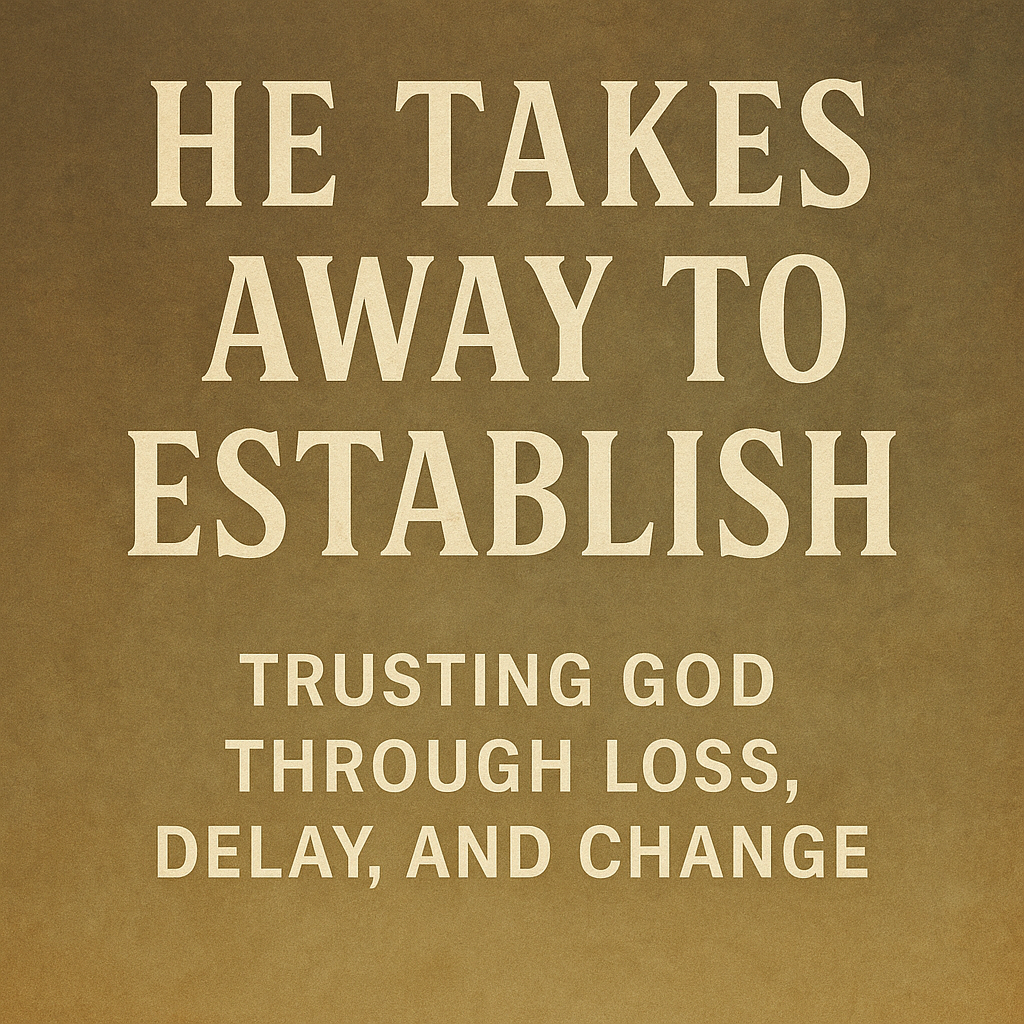Introduction: He Takes Away to Establish
- In a world of distractions, keep your eyes on Jesus.
Like Peter on the water, even seasoned believers can become overwhelmed by life’s winds and waves. This message is a call to refocus. - Hebrews 10:9 reveals a divine pattern:
“He taketh away the first, that He may establish the second.” God doesn’t just subtract—He transitions us from good to better, from familiar to eternal. - Delays aren’t denials—they’re tests.
Whether it’s unanswered prayer or spiritual stagnation, delay reveals whether we truly trust God’s timing—or if we’re prone to fear and impatience. - God often begins His greatest works in darkness.
From Genesis to Gethsemane, divine breakthroughs start when things look bleak. Don’t mistake silence for absence. - Letting go is part of stepping in.
Just like Joseph, Elijah, and Abraham, we must release the past to embrace what’s next. The removal isn’t rejection—it’s preparation. - Worry is the enemy of trust.
It magnifies fear, chokes faith, and turns created things into idols. God is calling us to worship, not worry. - You’re being positioned, not punished.
Loss, delay, and detours are part of God’s redemptive process. He’s not done with you—He’s establishing something better.
Keep Your Eyes on Jesus in a Distracting World
In a world filled with noise, chaos, and crisis, it’s easy to lose sight of the God we serve. Pastor John Kilpatrick reminds us that even strong believers like Peter took their eyes off Jesus when the wind and waves rose. Distractions are powerful, but so is the call to refocus on Christ. At the heart of this message is Hebrews 10:9: “He taketh away the first, that He may establish the second.” This verse unveils a divine truth: God removes what is temporary to make way for what is eternal, unshakable, and better.
The Spirit of Delay: Tammuz and the Testing of Trust
Many believers today are experiencing delay. Prayers seem unanswered. Promises feel stuck. This spiritual stagnation reflects two historic failures by Israel—both commemorated during the Hebrew month of Tammuz. The first was impatience at Mount Sinai, leading to idolatry. The second, fear at the edge of the Promised Land, brought a 40-year detour. Both moments revealed a lack of trust in God’s timing and character.
God Begins in the Evening
From Genesis, we see that God’s days begin at night: “The evening and the morning were the first day.” God often starts His greatest work when things seem darkest. Like a womb preceding birth or night before dawn, transformation begins in hiddenness. Don’t misjudge the silence or confusion—it’s often the beginning of divine creation.
From Removal to Establishment
Hebrews 10:9 isn’t about punishment. It’s about positioning. Just as a baby must leave the womb to enter life, we must release the old to walk in the new. When God takes something from us—be it a relationship, job, or ministry—it’s not to diminish us but to transition us into something better.
When a Bad Report Comes First
Before every miracle, there’s usually a bad report. Whether it’s an unfavorable scan or a betrayal like Joseph’s, God uses crisis to set the stage for His supernatural intervention. Don’t fear the negative report—it may mean the breakthrough is on its way.
Joseph: The Path from Pit to Palace
Joseph’s journey illustrates this perfectly. Stripped of his family, freedom, and reputation, Joseph endured years of darkness. But God elevated him in an instant. The loss was not a setback; it was the preparation for destiny.
From Old Wine to New Wineskins
Jesus taught that new wine must be put in new wineskins. Too many cling to the past, reminiscing about “the good old days,” resisting the better things God is doing now. Letting go of old seasons is essential to receiving new ones.
When the Brook Dries Up
Elijah enjoyed divine provision by the brook Cherith until it dried up. Why? Because God had a new assignment and a new source in Zarephath. Often, we don’t move until something familiar dries up. What feels like loss is often a divine prompt toward destiny.
Don’t Cling to What God Has Removed
Many try to resurrect relationships, ministries, or seasons that God has clearly ended. But if God took it away, it’s because He’s establishing something greater. Let go. Trust His plan. The brook has dried up for a reason.
The Trap of Worry
Worry speaks like an atheist. It chokes faith, magnifies fear, and attempts to control what only God can. Concern moves us to action, but worry paralyzes. Worse, it often reveals what we’ve made into a god—our job, health, money, or reputation.
Abraham’s Transformation
Abraham moved from a worrier in Egypt to a worshiper on Mount Moriah. When asked to sacrifice Isaac, he obeyed in faith, declaring, “The Lord will provide.” His trust became a model for all believers. God provided then—and He will again.
A Better Covenant, A Better Promise
Jesus didn’t just replace the Old Covenant. He fulfilled it and established a better one. He removed laws written on stone and wrote them on our hearts. Through His Spirit, we now have access to His power, His presence, and His promises—daily.
Final Word: You’re Being Positioned, Not Punished
If you’re in a season of loss, confusion, or delay—take heart. God is not punishing you. He is positioning you. The Holy Spirit says, “Stop worrying. I will provide.” Stand on His promises. Declare His faithfulness. And prepare for the second thing—the better thing—to be established in your life.
Five Things We Learned
- God removes what is temporary to establish what is eternal.
Loss is often the doorway to divine promotion. - Delay doesn’t mean denial—it often reveals distrust.
Like Israel, our failure to wait on God can cause unnecessary setbacks. - Worry is a form of unbelief and idolatry.
What we worry about most often reveals what we trust more than God. - God transitions us by letting familiar things dry up.
The drying brook is not abandonment—it’s a signal to move. - Faith obeys even when the outcome is uncertain.
Like Abraham, we can trust God to provide in the unknown.




